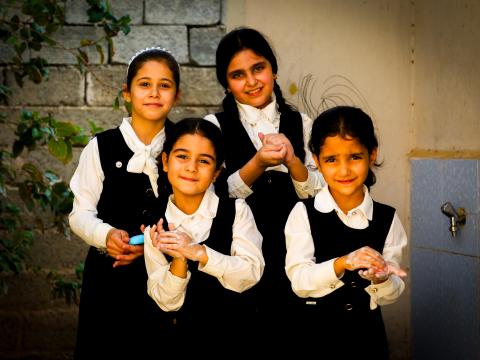Clean, safe, and inclusive: How WASH is transforming schools in Iraq

Written by Andreea Bujor, Communication and Advocacy Director
World Vision Iraq's new study on WASH in schools shows that access to clean, safe, and inclusive Water, Sanitation, and Hygiene (WASH) facilities In Tuz District, Salah Al-Din, is not just improving health—it's changing the future of education.
Data speaks
Schools with functional WASH facilities recorded a 30% increase in daily attendance, with 95% of students attending regularly, compared to only 65% of students in schools with poor WASH. Hygiene-related illnesses dropped to 10%, while poor-WASH schools reported 60%.
Improvements have led to a high proportion of schools with key WASH facilities:
- 90% have functional toilets
- 85% provide handwashing stations with soap
- 80% have menstrual hygiene facilities
- 75% include accessibility features for children with disabilities
Students also joined hygiene clubs and campaigns, while teachers reported improved knowledge and fewer cases of infections, rashes, and urinary tract issues. Confidence and emotional well-being rose sharply, particularly for girls and children with disabilities.
By contrast, poor-WASH schools experienced 31% absenteeism, 39% illness rates, and high levels of stress. Girls missed school due to a lack of private, clean facilities, and nearly all children with disabilities were unable to access toilets or washing stations.
A fresh start for students
For Payam, an English teacher and mother, the difference is personal. “In the past, students had to walk 400 meters to use broken and unsanitary toilets. Many missed lessons, especially during winter,” she explained. Today, thanks to new WASH facilities, toilets are just 25 metres from classrooms, with multiple handwashing stations close by.
Her daughter, Maili, who has just started first grade, was one of the first to use the new toilets. “I’m so happy because it’s clean! The new toilets are so much better,” she said. Payam added, “As a mother, I feel reassured. It makes a real difference.”
Why it matters
Access to clean and inclusive WASH facilities plays a vital role in improving children's overall health and school experience in a few key ways:
- Reducing illness and absenteeism
- Improving learning, concentration, and participation
- Promoting dignity and emotional well-being
- Ensuring girls and children with disabilities can attend school with confidence
Looking ahead
World Vision Iraq is launching a five-year WASH Business Plan to expand these life-changing improvements to more schools, supporting the nation's commitment to quality education and clean water for all. With a total investment of $7.65 million, the plan will provide clean water, sanitation, and hygiene access to over 110,000 people across six locations in Iraq, ensuring healthier, safer, and more inclusive learning and care environments.